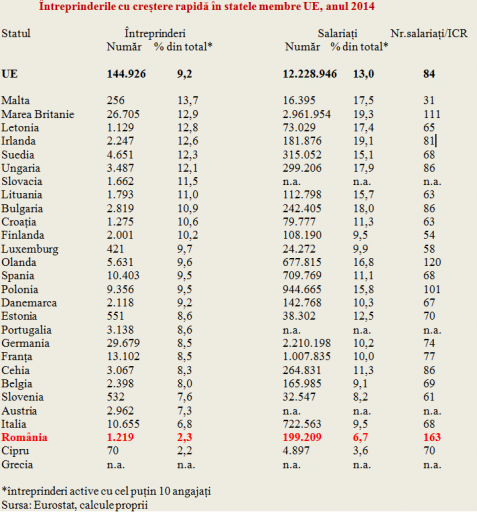 Romania ranks the second-to-last among EU member states in terms of number of enterprises rapidly growing (see the definition below), with a share of only 2.3%, four times lower than the European average.
Romania ranks the second-to-last among EU member states in terms of number of enterprises rapidly growing (see the definition below), with a share of only 2.3%, four times lower than the European average.
In these businesses, there are almost 200 thousand employees working, i.e. 6.7% of the total number of people employed, a slightly better positioning only because it exceeds half of the EU average.
Definition of concept – An enterprise with rapid growth – ICR – (at least 10%) is an enterprise that has an average increase of the number of employees exceeding 10% per year during three years and has at least 10 employees at the beginning of growth.
Only the small Cyprus is after us at a very small distance, with 2.2% and 70 enterprises having less than 5,000 employees, which makes the country statistics less relevant and places us far away from the rest of Europe (see table below) just at the bottom of the European best business practices.
- Businesses with rapid growth in the EU member states, in 2014
- Country Businesses Employees No of employees/ICR
- Number % of total* Number % of total*
- *active businesses with at least 10 employees
- Source: Eurostat, own calculations
This is a position that asks for an in-depth analysis of data of and urgent actions from the decision makers. Especially that just above us in the EU ranking, Italy presents a share of the ICR businesses almost triple.
This situation suggests that we have a big problem in this area, difficult to explain only by statistical variations.
As a development model, it would be useful for us to observe two important countries having the same share of enterprises with rapid growth that are among the top three foreign trade partners of Romania, Germany and France. Germany’s number of ICR businesses and related employees is more than double compared to our Latin sister, which reflects the positive effects of a more pronounced entrepreneurial spirit.
In the Balkans, close to us, Bulgaria and Croatia have much higher shares of ICR businesses than us, above the threshold of 10% and the European average.
Noteworthy for those who strive or not to create favourable conditions for the business environment, neighbours from the south of the Danube also have the highest share of employees in ICR enterprises at the EU level, after Ireland and UK.
The other neighbour from the EU, Hungary, also ranks among the first countries in terms of share of ICR companies and almost equals Bulgaria in terms of percentage of employees working in such enterprises. If we also looked at the situation in the Baltic countries, we should seriously pay attention and ask ourselves questions about the perspective of the Romanian enterprises’ competitiveness.
Finally, Poland, our model similar in terms of size, level of development and structure of the economy obviously outperforms us with an ICR percentage above the European average. Placed where it should be, in terms of size and interest, next to Spain.
Noteworthy, for the umpteenth time, the lack of data on Greece for a more specialized and complex statistical research. It is hard to say whether this was because of the crisis faced by the country following the wrong decisions that led to the explosion of public debt or the lack of information and / or neglection of statistical data contributed to the crisis outbreak.
If the we make the ratio of the number of employees to the number of enterprises with rapid growth, Romania stands out very easily, as the EU country with the highest average (163 employees / ICR), nearly twice the European average, of only 84 employees / ICR. This situation suggests that the problem is very localized at the level of small business, and given the average, it less affects the medium and large enterprises.
Somehow paradoxically, precisely this very poor position that we currently have in terms of small businesses with rapid development creates potential for growth and an opportunity to take measures for stimulating those businesses that wish to grow and create new jobs.
This is an essential factor for the economic development, maintaining competitiveness and the balance of budget.










